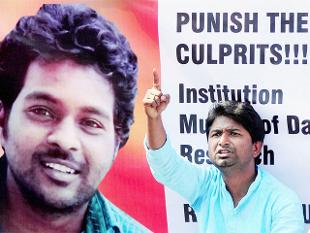New Delhi, Jan 20: The Human Resource Development (HRD) Ministry had sent at least four reminders to University of Hyderabad, seeking action taken report on Union Minister Bandaru Dattatreya’s complaint that the campus had become a “den of anti-national politics”.
 Officials concerned, however, defended the Ministry’s action, maintaining that the university was not directed to take action against any student. The defence came a day after they described the forwarding of Dattatreya’s letter to the Central university as a “routine affair”.
Officials concerned, however, defended the Ministry’s action, maintaining that the university was not directed to take action against any student. The defence came a day after they described the forwarding of Dattatreya’s letter to the Central university as a “routine affair”.
“The Ministry only followed the rules. According to central secretariat manual of office procedures, communications received from Members of Parliament have to be acknowledged within 15 days of their receipt, followed by reply within next 15 days,” HRD Ministry spokesperson Ghanshyam Goel said, refuting the charge that the varsity expelled five Dalit students under pressure from Union Minister Smriti Irani.
The explanations came after official letters of the HRD Ministry, written to University of Hyderabad seeking action taken report on Union Minister of State (MoS) for Labour and Employment Dattatreya’s complaint, began circulating in media circles and later went viral on social media on Tuesday.
“Hyderabad University in the recent past has become den of casteist, extremist and anti-national politics. I earnestly hope under your dynamic leadership things would change in this campus for the better,” Dattatreya stated in his letter to Irani on August 17, 2015.
The Minister sought Irani’s intervention on the request of a local BJP leader Nandanam Diwakar, who complained that N Susheel Kumar, a PhD student and leader of Akhil Bharatiya Vidyarthi Parishad, was assaulted by Ambedkar Students’ Association members on the campus after the former protested against a prayer meeting organised by them (Ambedkar association), for Parliament attack convict Yakub Memon.
“He was abused, interrogated, manhandled, tortured and humiliated for his facebook status—‘ASA goons are talking about hooliganism—feeling funny’. Attack on him is the consequence of unchallenged growth of violent tendency on university campus aided by the failings of university,“ Diwakar stated in his three-page letter to Dattatreya on August 10.
The BJP leader urged the Union Minister to take up the matter with “Home Minister, intelligence agencies and HRD Minister”, saying any further delay “in addressing the problems” will not only harm Kumar but also other students in the future.
Thereafter, at least four reminders were sent to the University seeking action taken report, on September 24, October 6, October 20 and November 19, 2015. “The comments/facts have not been received so far. It is requested that same may kindly be expedited to enable the Ministry to reply to MoS,” HRD Ministry’s under secretary wrote to the university registrar on November 19.





Comments
He looks very smart but the caste system buried his intelligence. When will V wake up to the oppression of the people who think they are superior.....
But I remember Prophet Muhammad pbuh teachings who said:
There is no God but ALLAH, Worship him Alone & dont associate partners with him.
He also said : All humans are from Adam & Eve, An arab is not superior than Non arab Nor A non arab superior than an arab, A white is not superior than Black, Nor a black superior than white.. EXCEPT by Piety & Good Deeds...
Man Made Caste system is digging the graves of others - If we dont realise the reality of Worship - We will be doomed like this smart youth.
Add new comment